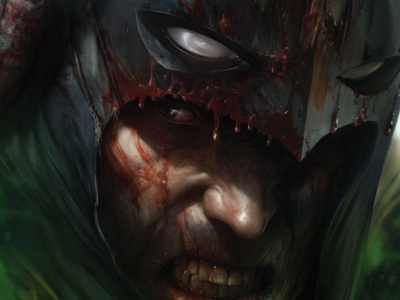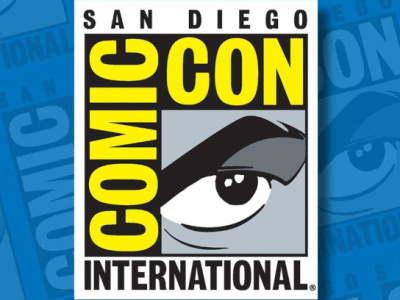 Confessions of a Comic Book Guy is a weekly column by Steve Bennett of Super-Fly Comics and Games in Yellow Springs, Ohio. This week, Bennett looks at celebrity comics and Eric Stephenson's comments on licensed comics.
Confessions of a Comic Book Guy is a weekly column by Steve Bennett of Super-Fly Comics and Games in Yellow Springs, Ohio. This week, Bennett looks at celebrity comics and Eric Stephenson's comments on licensed comics.As established last week, I can hold onto the most remarkable bits of trivia for decades while vital information continuously slips through my fingers. Like, I distinctly recall that when Seinfeld was at the height of its popularity, its star Jerry Seinfeld told some interviewer that he would love to write a Superman's Pal Jerry Seinfeld comic book for DC. It was just that he was too busy working on a hit network television show to do so, which as excuses go is top notch, but things have clearly slowed down a smidge in the intervening years. And yet, still no comic. What gives, Jerry?
Admittedly this must sound kind of strange coming from me, seeing as how I'm someone who is on the record as being ambivalent at best about "celebrity brand" comics (see "Confessions of a Comic Book Guy--Everything Comes Back"). But then 2008, the year I wrote that column, was kind of a banner year for celebrities launching their own comics; the list of titles done by "brand names" included Stephen Baldwin, Guy Ritchie, Ed Burns, John Mostow, Jenna Jameson and Stephen DeSouza. But ultimately I don't have a problem with anyone trying their hands at comics; the fact that anyone can do them is what makes them (in my mind) the most democratic of the arts.
So I honestly didn't think much about it either way when actress Alyssa Milano announced that the comic she created, The Hacktivist, was going to be published by Archaia Entertainment, a division of BOOM! Studios. Though she did earn absolute honesty points for revealing on The Late Late Show with Craig Ferguson the main reason she was turning her idea into a comic instead of a movie: making a comic book takes a lot less time. I didn't give it another thought, until the i09 website posted the entire first issue written by Jackson Lanzig and Collin Kelly, and drawn by Marcus To, online for free. I read it and it is quite good. If you have the time you should probably do the same.
But it never hurts if the celebrity doing the comic is also a fan. Like Gerard Way, singer of My Chemical Romance, gave me one of my favorite comics of the 00s, The Umbrella Academy. It has gone unseen since 2008, but it's expected to make a much welcome return later this year. Or, Lena Dunham, creator and star of Girls who is doing a four-part story for Archie (see "Lena Dunham to Write Archie Story"). In its own way this is as daring an extension of the publisher's brand as Afterlife With Archie was and naturally it's garnered loads of free publicity. And if anyone out there questions whether Dunham is a "real fan," as she says herself, "I was an avid Archie collector as a child--conventions, first editions that I kept in plastic sleeves, the whole shebang."
Over the years I've visited and revisited the subject of licensed comics vs. creator owned ones, literally too many to comfortably list here. But, in a nutshell, I've frequently complained that there were way too many licensed comics and not nearly enough good independently owned and operated ones. Earlier this month Eric Stephenson, Publisher of Image Comics, gave an address at ComicsPRO in Atlanta. where he talked on that very subject. You could and should go read what he said over on the Bleeding Cool website in a piece titled "Star Wars Comics Will Never Be the Real Thing--Eric Stephenson, Publisher of Image Comics, Talks to ComicsPRO."
I agreed with what he said, mostly, so I probably should be feeling somewhat validated but he also said something that made me blanch: that comics like Transformers, G.I. Joe and Star Wars would "never be the real thing." I still want there to be more good creator owned comics like Saga, but after a great deal of reflection I've finally come to the realization that what I want and what Eric wants doesn't really enter into it.
It's what the readers want. The truth of the matter is publishers print a large number of licensed titles and the retail market sells a lot of those comics because a lot of people buy them. They are, in short, what the readers want as much as we would like it to be otherwise, and the fact that they exist doesn't prevent "good creator owned comics" from being published. Publishers don't publish licensed comics because they're creatively bankrupt or relentlessly venal; it's because the brand name recognition they receive from licensed titles is the only way they can compete with Marvel and DC and stay in business. And those readers? They're not intentionally purchasing an inferior product because they're stupid; they're buying those licensed comics because they enjoy them, because they think they're "good" too.
I agree that we need to have a discussion about how we can publish and sell more creator owned comics, but that discussion really shouldn't start with what the other guy is doing "wrong." A more sensible palce to start would seem to be asking ourselves what they're doing right. .
The opinions expressed in this column are solely those of the writer, and do not necessarily reflect the views of the editorial staff of ICv2.com.







